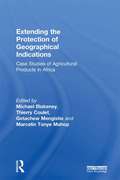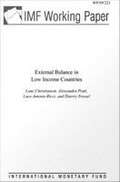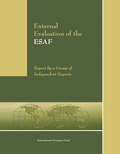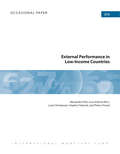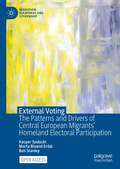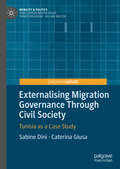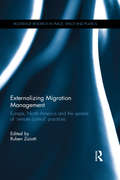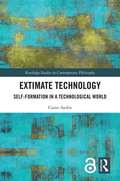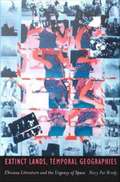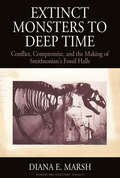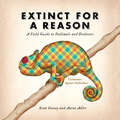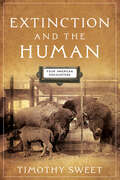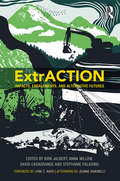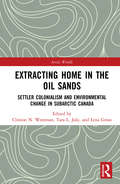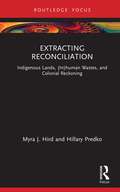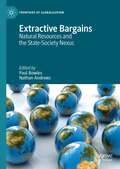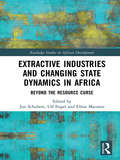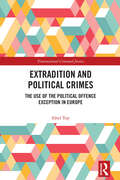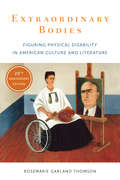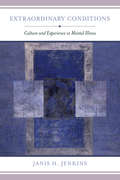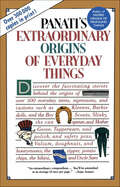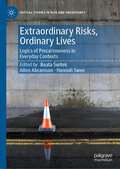- Table View
- List View
Extending the Protection of Geographical Indications: Case Studies of Agricultural Products in Africa
by Michael Blakeney Thierry Coulet Getachew Mengistie Marcelin Tonye MahopThe TRIPS Agreement (for trade-related intellectual property rights) provides for the general protection of geographical indications (GIs) of product origin, including for example the special protection of wines and spirits and for the creation of a multilateral register for wines. The African Group of countries has been in the forefront of countries agitating in the World Trade Organization TRIPS Council for the extension of this special protection and of the multilateral register to industries which are of interest to developing countries, primarily agriculture. The so-called "extension question" is the central feature of the Doha Development Agenda at both the WTO and World Intellectual Property Organization. This book provides some empirical evidence and applied legal and economic reasoning to this debate. It provides both a general review of the key issues and a series of case studies from six Anglophone and four Francophone countries in Africa. These focus on major agricultural commodities such as coffee, cotton, cocoa and tea, as well as more specific and local products such as Argan oil and Oku white honey.
External Balance in Low Income Countries
by Alessandro Prati Luca Antonio Ricci Lone Christiansen Thierry TresselA report from the International Monetary Fund.
External Debt and Growth
by Hélène Poirson Catherine Pattillo Luca RicciA report from the International Monetary Fund.
External Evaluation of the Esaf
by International Monetary Fund#Includes bibliographical references (p. ).
External Performance in Low-Income Countries
by Alessandro Prati Luca Antonio Ricci Lone Christiansen Stephen Tokarick Thierry TresselAssessments of exchange rate misalignments and external imbalances for low-income countries are challenging because methodologies developed for advanced and emerging economies cannot be automatically applied to poorer nations. This paper uses a large database, unique in the set of indicators and number of countries it covers, to estimate the relationship in low-income countries between a set of fundamentals in the medium to long term and the real effective exchange rate, the current account, and the net external assets position.
External Voting: The Patterns and Drivers of Central European Migrants' Homeland Electoral Participation (Migration, Diasporas and Citizenship)
by Marta Bivand Erdal Kacper Szulecki Ben StanleyThis open access book is the first monograph that brings together insights from comparative politics, political sociology, and migration studies to introduce the current state of knowledge on external voting and transnational politics. Drawing on new data gathered within the DIASPOlitic project, which created a comparative dataset of external voting results for 6 countries of origin and 17 countries of residence as well as an extensive qualitative dataset of 80 in-depth interviews with four groups of migrants, this book not only illustrates theoretical problems with empirical material, but also provides answers to previously unaddressed questions. The empirical material focuses on the European context. The Eastern Enlargement of the European Union (2004-2007) triggered a westward wave of migration from Central and Eastern European countries which faced the expansion of existing émigré communities and the emergence of new ones. As this process coincided with the expansion of migrant voting rights, the result is a large set of populous diaspora communities which can potentially have a significant impact on country electoral politics, making the study of external voting highly relevant. This book’s introduction takes stock of current research on transnational politics and external voting, presenting core puzzles. The following chapter introduces the context of intra-European migration and the political situation in Central-Eastern European sending countries. The next two sections address the empirical puzzles, drawing on new quantitative and qualitative. The conclusion takes stock of the evidence gathered, discusses the normative problem of non-resident voters enfranchisement, connects external voting to the broader debate on political remittances and finally, maps the terrain ahead for future research. This concise, empirically grounded introduction to external voting is critical reading in structuring the debate around migration and shaping research agendas for the future.
Externalising Migration Governance Through Civil Society: Tunisia as a Case Study (Mobility & Politics)
by Sabine Dini Caterina GiusaThis book investigates how the externalisation of EU migration policies is implemented in Tunisia after the fall of the Ben Ali regime in 2011 through the involvement of civil society organisations. The ‘democratic transition’ initiated by the Tunisian Revolution led to the emergence of a ‘vibrant civil society’ as a new actor in the implementation of migration policies. In a country where migration issues are highly politicised and have strongly entered the public space, civil society is now included in the EU-Tunisia negotiation process and is assigned the role of an intermediary for the implementation of controversial European policies related to sedentarisation of the Tunisian population and to the construction of Tunisia as a ‘country of destination’. The volume concludes by suggesting an alternative way of thinking about migrant struggles challenging the European border regime as ‘uncivil society’ struggles.
Externalizing Migration Management: Europe, North America and the spread of 'remote control' practices (Routledge Research in Place, Space and Politics)
by Ruben ZaiottiThe extension of border controls beyond a country’s territory to regulate the flows of migrants before they arrive has become a popular and highly controversial policy practice. Today, remote control policies are more visible, complex and widespread than ever before, raising various ethical, political and legal issues for the governments promoting them. The book examines the externalization of migration control from an interdisciplinary and comparative perspective, focusing on ‘remote control’ initiatives in Europe and North America, with contributions from the fields of politics, sociology, law, geography, anthropology, and history. This book uses empirically rich analyses and compelling theoretical insights to trace the evolution of ‘remote control’ initiatives and assesses their impact and policy implications. It also explores competing theoretical models that might explain their emergence and diffusion. Individual chapters tackle some of the most puzzling questions underlying remote control policies, such as the reasons why governments adopt these policies and what might be their impact on migrants and other actors involved.
Extimate Technology: Self-Formation in a Technological World (Routledge Studies in Contemporary Philosophy)
by Ciano AydinThis book investigates how we should form ourselves in a world saturated with technologies that are profoundly intruding in the very fabric of our selfhood. New and emerging technologies, such as smart technological environments, imaging technologies and smart drugs, are increasingly shaping who and what we are and influencing who we ought to be. How should we adequately understand, evaluate and appreciate this development? Tackling this question requires going beyond the persistent and stubborn inside-outside dualism and recognizing that what we consider our "inside" self is to a great extent shaped by our "outside" world. Inspired by various philosophers – especially Nietzsche, Peirce and Lacan –this book shows how the values, goals and ideals that humans encounter in their environments not only shape their identities but also enable them to critically relate to their present state. The author argues against understanding technological self-formation in terms of making ourselves better, stronger and smarter. Rather, we should conceive it in terms of technological sublimation, which redefines the very notion of human enhancement. In this respect the author introduces an alternative, more suitable theory, namely Technological Sublimation Theory (TST). Extimate Technology will be of interest to scholars and advanced students working in philosophy of technology, philosophy of the self, phenomenology, pragmatism, and history of philosophy.
Extinct Lands, Temporal Geographies: Chicana Literature and the Urgency of Space
by Mary Pat BradyA train station becomes a police station; lands held sacred by Apaches and Mexicanos are turned into commercial and residential zones; freeway construction hollows out a community; a rancho becomes a retirement community--these are the kinds of spatial transformations that concern Mary Pat Brady in Extinct Lands, Temporal Geographies, a book bringing together Chicana feminism, cultural geography, and literary theory to analyze an unusual mix of Chicana texts through the concept of space. Beginning with nineteenth-century short stories and essays and concluding with contemporary fiction, this book reveals how Chicana literature offers a valuable theoretics of space. The history of the American Southwest in large part entails the transformation of lived, embodied space into zones of police surveillance, warehouse districts, highway interchanges, and shopping malls--a movement that Chicana writers have contested from its inception. Brady examines this long-standing engagement with space, first in the work of early newspaper essayists and fiction writers who opposed Anglo characterizations of Northern Sonora that were highly detrimental to Mexican Americans, and then in the work of authors who explore border crossing. Through the writing of Sandra Cisneros, Cherríe Moraga, Terri de la Peña, Norma Cantú, Monserrat Fontes, Gloria Anzaldúa, and others, Brady shows how categories such as race, gender, and sexuality are spatially enacted and created--and made to appear natural and unyielding. In a spatial critique of the war on drugs, she reveals how scale--the process by which space is divided, organized, and categorized--has become a crucial tool in the management and policing of the narcotics economy.
Extinct Monsters to Deep Time: Conflict, Compromise, and the Making of Smithsonian's Fossil Halls (Museums and Collections #11)
by Diana E. MarshExtinct Monsters to Deep Time is an ethnography that documents the growing friction between the research and outreach functions of the museum in the 21st century. Marsh describes participant observation and historical research at the Smithsonian’s National Museum of Natural History as it prepared for its largest-ever exhibit renovation, Deep Time. As a museum ethnography, the book provides a grounded perspective on the inner-workings of the world’s largest natural history museum and the social processes of communicating science to the public.
Extinct for a Reason
by Aaron Adler Scott CooneyBefore there was Darwin, before there was man's best friend, there were . . . Failimals. The Royal Failimal Society presents the Unchameleon, Bipolar Bear, Emo Emu, and other Darwin-defiant animals that, though fascinating, have clearly become extinct for a reason. The culmination of years of research, study, and observation across each continent and every era, Extinct for a Reason is the definitive field guide to the hows, whys, and whats of Failimals and Evolosers. With colorful illustrations and vital information on everything from mating habits to defense mechanisms, this book is a must-have for any species considering undergoing the evolutionary process. Learn how to avoid common mistakes, such as: Alienating oneself from one's peers (see: Goth Sloth) Refusing to admit one's genes are improperly sized (see: Muffintopotamus) Having dangerously high levels of charisma (see: Elvisaurus) Weeded out but still proud, the curious creatures collected within serve as a warning to ambitious animals everywhere: Evolve with Caution.
Extinction and the Human: Four American Encounters (Alembics: Penn Studies in Literature and Science)
by Timothy SweetThe Americas have been the site of two distinct waves of human migration, each associated with human-caused extinctions. The first occurred during the late Pleistocene era, some ten to thirty thousand years ago; the other began during the time of European settler-colonization and continues to this day.In Extinction and the Human Timothy Sweet ponders the realities of animal extinction and endangerment and the often divergent Native American and Euro-American narratives that surround them. He focuses especially on the force of human impact on megafauna—mammoths, whales, and the North American bison—beginning with the moments that these species' extinction or endangerment began to generate significant print archives: transcriptions of traditional Indigenous oral narratives, historical and scientific accounts, and literary narratives by Indigenous American and Euro-American authors. "If the Sixth Extinction is a hyperobject, an event so massively distributed in space and time that it cannot be experienced directly," he writes, "these cases of particular megafauna have nevertheless consistently commanded our focus and attention. They form a starting point for a coherent, approachable history."Reflecting on questions of agency, responsibility, and moral assessment, Sweet engages with the consequences of thinking of humans as fundamentally separate from the rest of the natural world. He investigates stories of a lost race of giants at the time of the first encounters between Europeans and Indigenous Americans; culturally distinct ways of understanding the extinction of the mammoths; the impact of the Euro-American whaling industry and the controversial revitalization of Native American whaling traditions; and the bison's near-extermination at the hands of white market hunters and today's Euro-American and Native American efforts on behalf of the animal's preservation. He reflects on humans' relations with animals through models of divine preservation, competitive extermination, evolutionary determination, biophilia, and treaties with animals. Ultimately, he argues, it is the critical assessment of ideas of human exceptionalism that provides a necessary counterpoint both to apologies for human mastery over nature and deep ecology's attempts to erase the human.
ExtrACTION: Impacts, Engagements, and Alternative Futures
by Anna Willow David Casagrande Kirk Jalbert Stephanie PaladinoThis timely volume examines resistance to natural resource extraction from a critical ethnographic perspective. Using a range of case studies from North, Central and South America, Australia, and Central Asia, the contributors explore how and why resistance movements seek to change extraction policies, evaluating their similarities, differences, successes and failures. A range of ongoing debates concerning environmental justice, risk and disaster, sacrifice zones, and the economic cycles of boom and bust are considered, and the roles of governments, free markets and civil society groups re-examined. Incorporating contributions from authors in the fields of anthropology, public policy, environmental health, and community-based advocacy, ExtrACTION offers a robustly argued case for change. It will make engaging reading for academics and students in the fields of critical anthropology, public policy, and politics, as well as activists and other interested citizens.
Extracting Home in the Oil Sands: Settler Colonialism and Environmental Change in Subarctic Canada (Arctic Worlds)
by Clinton N. Westman Tara L. Joly Lena GrossThe Canadian oil sands are one of the world’s most important energy sources and the subject of global attention in relation to climate change and pollution. This volume engages ethnographically with key issues concerning the oil sands by working from anthropological literature and beyond to explore how people struggle to make and hold on to diverse senses of home in the region. The contributors draw on diverse fieldwork experiences with communities in Alberta that are affected by the oil sands industry. Through a series of case studies, they illuminate the complexities inherent in the entanglements of race, class, Indigeneity, gender, and ontological concerns in a regional context characterized by extreme extraction. The chapters are unified in a common concern for ethnographically theorizing settler colonialism, sentient landscapes, and multispecies relations within a critical political ecology framework and by the prominent role that extractive industries play in shaping new relations between Indigenous Peoples, the state, newcomers, corporations, plants, animals, and the land.
Extracting Reconciliation: Indigenous Lands, (In)human Wastes, and Colonial Reckoning (More Than Human Humanities)
by Myra J. Hird Hillary PredkoExtracting Reconciliation argues that reconciliation constitutes a critical contemporary mechanism through which colonialism is seeking to ensure continuing access to Indigenous lands and resources. Making use of two historical case studies concerned with the intersection of resource extraction, Crown/Inuit relations, and waste legacies in Nunavut, Canada, the authors illuminate the mechanisms of colonial and neoliberal governance globally that promise reconciliation while delivering the status quo. Through Indigenous and non-Indigenous anticolonial and posthuman concepts and theories, the book engages with the inhuman politics of settler colonial extractivism and explores the socio-ethical social justice dimensions, political possibilities, and environmental implications of a much more challenging and accountable reckoning between (settler) colonialism and Indigenous land rights. This book is of interest to students and scholars in gender studies, postcolonial studies, environmental studies, Indigenous studies, and politics.
Extractive Bargains: Natural Resources and the State-Society Nexus (Frontiers of Globalization)
by Paul Bowles Nathan AndrewsThis book is the first to focus on state-led ‘extractive bargains,’ designed to reach a social consensus on the extent of extractive activities, how they should be governed and their negative consequences mitigated. These state-led ‘bargains’ have taken a number of different forms and offer varying degrees of promise in meeting environmental and social concerns. The book critically examines ‘bargains’ in states across the Global North and the Global South, incorporates Indigenous issues, and judiciously assesses their prospects for promoting long-term sustainability. It focusses on mineral and fossil fuel extraction in particular including bargains designed to govern the former as the demand for minerals used in “green energy” increases and to limit the use of the latter.The book will be of interest to students and researchers of global studies, global political economy, political science, political sociology, sustainability, environmental sociology, development studies and geography. Chapter 1 is available open access under a Creative Commons Attribution 4.0 International License via link.springer.com.
Extractive Industries and Changing State Dynamics in Africa: Beyond the Resource Curse (Routledge Studies in African Development)
by Jon Schubert Ulf Engel Elísio MacamoThis book uses extractive industry projects in Africa to explore how political authority and the nation-state are reconfigured at the intersection of national political contestations and global, transnational capital. Instead of focusing on technological zones and the new social assemblages at the actual sites of construction or mineral extraction, the authors use extractive industry projects as a topical lens to investigate contemporary processes of state-making at the state–corporation nexus. Throughout the book, the authors seek to understand how public political actors and private actors of liberal capitalism negotiate and redefine notions and practices of sovereignty by setting legal, regulatory and fiscal standards. Rather than looking at resource governance from a normative perspective, the authors look at how these negotiations are shaped by and reshape the self-conception of various national and transnational actors, and how these jointly redefine the role of the state in managing these processes for the ‘greater good’. Extractive Industries and Changing State Dynamics in Africa will be useful for researchers, upper-level students and policy-makers who are interested in new articulations of state-making and politics in Africa.
Extradition and Political Crimes: The Use of the Political Offence Exception in Europe (Transnational Criminal Justice)
by Sibel TopThis book examines the evolution and current application of the political offence exception clause to extradition in Europe.The long-standing academic exploration of terrorism has recently given way to renewed interest in the political offence exception to extradition, prompted by recent events that signal a democratic downturn globally. Despite the significant curtailment – and, in some cases, the complete abolition – of the political offence exception to extradition in Europe, certain European states continue to quietly implement this exception to deny extradition requests. This work studies the development of the political offence exception in Europe by narrowing its focus from an international perspective to the European context, specifically examining the Council of Europe and the European Union, before zeroing in on the Catalan independence crisis, which offers a particularly valuable case for analysing the application of the political offence exception in the European context.By providing a detailed examination of the evolving protections for political offenders within European legal frameworks, the text updates the long overdue academic knowledge on the matter. It is therefore an essential resource for anyone interested in European criminal law and extradition, in particular. It will also be of interest to researchers, academics, and policy-makers working in the areas of criminal law, human rights law, legal theory, criminology, and political science.
Extraordinarily Ordinary: Us Weekly and the Rise of Reality Television Celebrity
by Erin A. MeyersExtraordinarily Ordinary offers a critical analysis of the production of a distinct form of twenty-first century celebrity constructed through the exploding coverage of reality television cast members in Us Weekly magazine. Erin A. Meyers connects the economic and industrial forces that helped propel Us Weekly to the top of the celebrity gossip market in the early 2000s with the ways in which reality television cast members fit neatly into the social and cultural norms that shaped the successful gossip formulas of the magazine. Us Weekly’s construction of the “extraordinarily ordinary” celebrity within its gossip narratives is a significant symptom of the broader intensification of discourses of ordinariness and the private in the production of contemporary celebrity, in which fame is paradoxically grounded in “just being yourself” while simultaneously defining what the “right” sort of self is in contemporary culture.
Extraordinary Bodies: Figuring Physical Disability in American Culture and Literature
by Rosemarie Garland ThomsonExtraordinary Bodies is a cornerstone text of disability studies, establishing the field upon its publication in 1997. Framing disability as a minority discourse rather than a medical one, the book added depth to oppressive narratives and revealed novel, liberatory ones. Through her incisive readings of such texts as Harriet Beecher Stowe's Uncle Tom's Cabin and Rebecca Harding Davis's Life in the Iron Mills, Rosemarie Garland-Thomson exposed the social forces driving representations of disability. She encouraged new ways of looking at texts and their depiction of the body and stretched the limits of what counted as a text, considering freak shows and other pop culture artifacts as reflections of community rites and fears. Garland-Thomson also elevated the status of African-American novels by Toni Morrison and Audre Lorde. Extraordinary Bodies laid the groundwork for an appreciation of disability culture and an inclusive new approach to the study of social marginalization.
Extraordinary Conditions
by Janis H. JenkinsWith a fine-tuned ethnographic sensibility, Janis H. Jenkins explores the lived experience of psychosis, trauma, and depression among people of diverse cultural orientations, revealing how mental illness engages fundamental human processes of self, desire, gender, identity, attachment, and interpretation. Extraordinary Conditions illuminates the cultural shaping of extreme psychological suffering and the social rendering of the mentally ill as nonhuman or not fully human. Jenkins contends that mental illness is better characterized in terms of struggle than symptoms and that culture is central to all aspects of mental illness from onset to recovery. Her analysis refashions the boundaries between the ordinary and the extraordinary, the routine and the extreme, and the healthy and the pathological. This book asserts that the study of mental illness is indispensable to the anthropological understanding of culture and experience, and reciprocally that understanding culture and experience is critical to the study of mental illness.
Extraordinary Groups: An Examination of Unconventional Lifestyles (Ninth Edition)
by Richard T. Schaefer William W. ZellnerNow in its ninth edition, Extraordinary Groups has had a most gratifying history. Written by sociologists, using and illustrating sociological principles, the book has also been adopted in various other social science courses, including anthropology, religion, history, and psychology. This interdisciplinary approach is one reason the book has been used in hundreds of colleges and universities, a number that continues to grow.
Extraordinary Origins of Everyday Things
by Charles PanatiAstonishing stories behind 500 everyday items, expressions, and customs—from Kleenex to steak sauce, Barbie Dolls to honeymoons.For lovers of facts, students of popular culture, history buffs, and science enthusiasts, the foremost specialist on everything tells us how and why hundreds of the everyday items, expressions, and customs we take for granted came into existence. Learn the fascinating discovery stories behind over 500 phenomena, including:How chewing gum and Silly Putty began as substitutes for rubberHow the potato chip emerged from an act of pique on the part of a Native American named CrumWhy April Fool’s Day started out as New Year’s Eve, a joke in itselfHow the song “Happy Birthday to You” began as a kindergarten jingle titled “Good Morning to All”How the zipper was one man’s attempt to make obsolete not buttons . . . but shoelacesHow the newlywed husband came to the aid of his accident-prone bride with the invention of the Band-AidHow the hotdog began as an outlawed Roman sausage and received its name at a New York baseball gameHow Drs. Fallopius and Condom made strides in inventing and popularizing a male means of birth controlHow the original Goldilocks was a disgruntled, gray-haired crone, tortured by the three bearsHow Ketchup came from the Romans, Tabasco sauce from an exiled New Orleans banker, Mayonnaise from a French duke, and A.1. Steak Sauce from a royal chef named Brand And many, many more in this carefully organized, delicious compendium of little-known facts—guaranteed to amaze, absorb, amuse, and delight.
Extraordinary Risks, Ordinary Lives: Logics of Precariousness in Everyday Contexts (Critical Studies in Risk and Uncertainty)
by Allen Abramson Beata Świtek Hannah SweeThis book untangles the relationship between expert categorisations of risk and the on-the-ground experiences of untrained ‘ordinary’ people who may be routinely subjected to significant danger in a variety of extraordinary contexts. It considers political, ethical and moral dimensions of risk and calls for more targeted ethnographic research, designed to reveal how grass-roots risk dispositions and practice intersect with official discourses, individual agency and community resilience.
